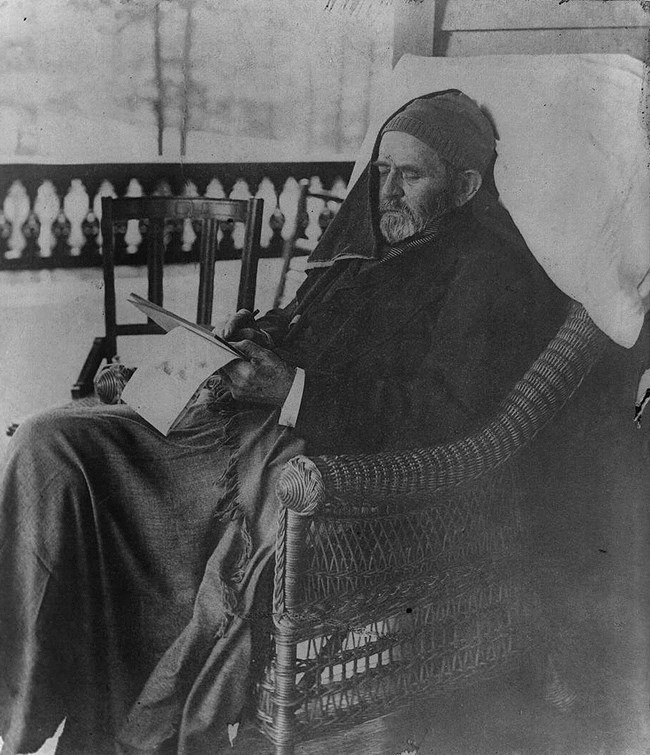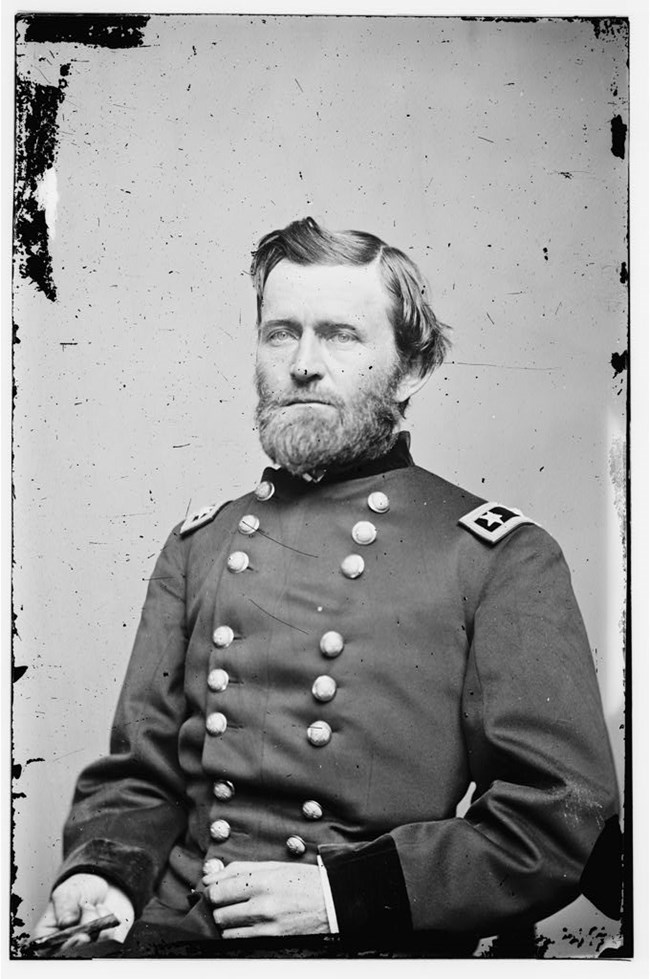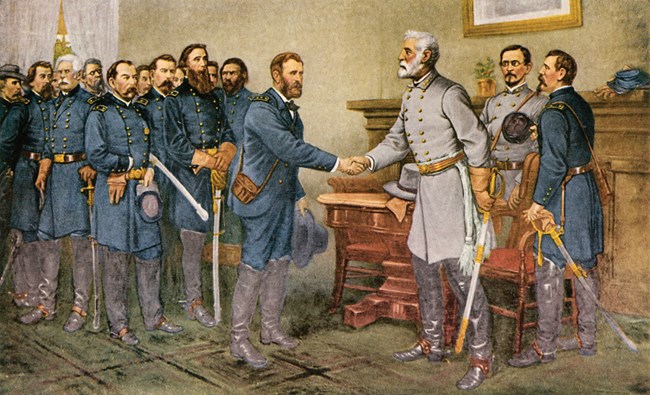Last updated: April 9, 2020
Article
Lessons from the Personal Memoirs of U.S. Grant

Library of Congress
Preface to the Memoirs
“Man proposes and God disposes.” There are but few important events in the affairs of men brought about by their own choice.
Although frequently urged by friends to write my memoirs I had determined never to do so, nor to write anything for publication. At the age of nearly sixty-two I received an injury from a fall, which confined me closely to the house while it did not apparently affect my general health. This made study a pleasant pastime. Shortly after, the rascality of a business partner developed itself by the announcement of a failure. This was followed soon after by universal depression of all securities, which seemed to threaten the extinction of a good part of the income still retained, and for which I am indebted to the kindly act of friends. At this juncture the editor of the Century Magazine asked me to write a few articles for him. I consented for the money it gave me; for at that moment I was living upon borrowed money. The work I found congenial, and I determined to continue it. The event is an important one for me, for good or evil; I hope for the former.
In preparing these volumes for the public, I have entered upon the task with the sincere desire to avoid doing injustice to any one, whether on the National or Confederate side, other than the unavoidable injustice of not making mention often where special mention is due. There must be many errors of omission in this work, because the subject is too large to be treated of in two volumes in such way as to do justice to all the officers and men engaged. There were thousands of instances, during the rebellion, of individual, company, regimental and brigade deeds of heroism which deserve special mention and are not here alluded to. The troops engaged in them will have to look to the detailed reports of their individual commanders for the full history of those deeds.
The first volume, as well as a portion of the second, was written before I had reason to suppose I was in a critical condition of health. Later I was reduced almost to the point of death, and it became impossible for me to attend to anything for weeks. I have, however, somewhat regained my strength, and am able, often, to devote as many hours a day as a person should devote to such work. I would have more hope of satisfying the expectation of the public if I could have allowed myself more time. I have used my best efforts, with the aid of my eldest son, F.D. Grant, assisted by his brothers, to verify from the records every statement of fact given. The comments are my own, and show how I saw the matters treated of whether others saw them in the same light or not.
With these remarks I present these volumes to the public, asking no favor but hoping they will meet the approval of the reader.
U.S. Grant
Mount MacGregor, New York, July 1, 1885
Courtship and Marriage to Julia Dent Grant
“At West Point I had a class-mate—in the last year of our studies he was a room-mate also—F.T. Dent [Frederick T. Dent, Jr.], whose family resided some five miles west of Jefferson Barracks. Two of his unmarried brothers were living at home at that time, and as I had taken with me from Ohio, my horse, saddle and bridle, I soon found my way out to White Haven, the name of the Dent estate. As I found the family congenial my visits became frequent . . . There was still an older daughter of seventeen [Julia Dent], who had been spending several years at boarding-school in St. Louis, but who, though through school, had not yet returned home. She was spending the winter in the city with connections, the family of Colonel John O’Fallon, well known in St. Louis. In February [1844] she returned to her country home. After that I do not know but my visits became more frequent; they certainly did become more enjoyable. We would often take walks, or go on horseback to visit the neighbors, until I became quite well acquainted in that vicinity . . . If the 4th Infantry had remained at Jefferson Barracks it is possible, even probable, that this life might have continued for some years without my finding out that there was anything serious the matter with me.
“Before I returned I mustered up courage to make known, in the most awkward manner imaginable, the discovery I had made on learning that the 4th Infantry had been ordered away from Jefferson Barracks. The young lady afterwards admitted that she too, although until then she had never looked upon me other than as a visitor whose company was agreeable to her, had experienced a depression of spirits she could not account for when the regiment left. Before separating it was definitely understood that at a convenient time we would join our fortunes, and not let the removal of a regiment trouble us. This was in May, 1844. It was the 22d of August, 1848, before the fulfillment of this agreement. My duties kept me on the frontier of Louisiana with the Army of Observation during the pendency of Annexation; and afterwards I was absent through the war with Mexico, provoked by the action of the army, if not by the annexation itself. During the time there was a constant correspondence between Miss Dent and myself, but we only met once in the period of four years and three months. In May, 1845, I procured a leave for twenty days, visited St. Louis, and obtained the consent of the parents for the union, which had not been asked for before.”

Library of Congress
“…I received orders to move against Colonel Thomas Harris, who was said to be encamped at the little town of Florida, some twenty-five miles south of where we then were.
“…Harris had been encamped in a creek bottom for the sake of being near water. The hills on either side of the creek extend to a considerable height, possibly more than a hundred feet. As we approached the brow of the hill from which it was expected we could see Harris’ camp, and possibly find his men ready formed to meet us, my heart kept getting higher and higher until it felt to me as though it was in my throat. I would have given anything then to have been back in Illinois, but I had not the moral courage to halt and consider what to do; I kept right on. When we reached a point from which the valley below was in full view I halted. The place where Harris had been encamped a few days before was visible, but the troops were gone. My heart resumed its place. It occurred to me at once that Harris had been as much afraid of me as I had been of him. This was a view of the question I had never taken before; but it was one I never forgot afterwards. From that event to the close of the war, I never experienced trepidation upon confronting an enemy, though I always felt more or less anxiety. I never forgot that he had as much reason to fear my forces as I had his. The lesson was valuable.”
Grant’s Determination at Shiloh
It was one of Grant's worst days. The Confederate army had managed to surprise the Union forces in the early morning hours of April 6th, 1862 and drove some elements all the way to the banks of the Tennessee River. In his memoirs, Grant described that night:
“During the night rain fell in torrents and our troops were exposed to the storm without shelter. I made my headquarters under a tree a few hundred yards back from the river bank. My ankle was so much swollen from the fall of my horse the Friday night preceding, and the bruise was so painful, that I could get no rest. The drenching rain would have precluded the possibility of sleep without this additional cause. Some time after midnight, growing restive under the storm and the continuous pain, I moved back to the loghouse under the bank. This had been taken as a hospital, and all night wounded men were being brought in, their wounds dressed, a leg or an arm amputated as the case might require, and everything being done to save life or alleviate suffering. The sight was more unendurable than encountering the enemy's fire, and I returned to my tree in the rain.”
The famous Grant historian Bruce Catton described a meeting between generals:
“Late that night tough Sherman came to see him. Sherman had found himself, in the heat of the enemy's fire that day, but now he was licked; as far as he could see, the important next step was "to put the river between us and the enemy, and recuperate," and he hunted up Grant to see when and how the retreat could be arranged. He came on Grant, at last, at midnight or later, standing under the tree in the heavy rain, hat slouched down over his face, coat-collar up around his ears, a dimly-glowing lantern in his hand, cigar clenched between his teeth. Sherman looked at him; then, "moved," as he put it later, "by some wise and sudden instinct" not to talk about retreat, he said: "Well, Grant, we've had the devil's own day, haven't we?"
Grant said "Yes," and his cigar glowed in the darkness as he gave a quick, hard puff at it, "Yes. Lick 'em tomorrow, though."
And that they did. The regrouped Union Army pushed forward on April 7th and successfully regained the ground they had lost the day before and turned near certain defeat into victory. Grant's determination had proven to be a critical element.

Granger Historical Picture Archive (public domain)
“On the 8th [of April] I had followed the Army of the Potomac in rear of Lee. I was suffering very severely with a sick headache, and stopped at a farmhouse on the road some distance in rear of the main body of the army. I spent the night in bathing my feet in hot water and mustard, and putting mustard plasters on my wrists and the back part of my neck, hoping to be cured by morning. During the night I received Lee’s answer to my letter of the 8th, inviting an interview between the lines on the following morning . . . when the officer reached me I was still suffering with the sick headache; but the instant I saw the contents of the note I was cured.
“ . . . When I had left camp that morning I had not expected so soon the result that was then taking place, and consequently was in rough garb. I was without a sword, as I usually was when on horseback on the field, and wore a soldier’s blouse for a coat, with the shoulder straps of my rank to indicate to the army who I was. When I went into the house I found General Lee. We greeted each other, and after shaking hands took our seats. In had my staff with me, a good portion of whom were in the room during the whole of the interview.
“What General Lee’s feelings were I do not know. As he was a man of much dignity, with an impassable face, it was impossible to say whether he felt inwardly glad that the end had finally come, or felt sad over the result, and was too manly to show it. Whatever his feelings, they were entirely concealed from my observation; but my own feelings, which had been quite jubilant on the receipt of his letter, were sad and depressed. I felt like anything rather than rejoicing at the downfall of a foe who had fought so long and valiantly, and had suffered so much for a cause, though that cause was, I believe, one of the worst for which a people ever fought, and one for which there was the least excuse. I do not question, however, the sincerity of the great mass of those who were opposed to us.”
Grant’s Views on the Causes of the Civil War
“The cause of the great War of the Rebellion against the United States will have to be attributed to slavery. For some years before the war began it was a trite saying among some politicians that ‘A state half slave and half free cannot exist.’ All must become slave or all free, or the state will go down. I took no part myself in any such view of the case at the time, but since the war is over, reviewing the whole question, I have come to the conclusion that the saying is quite true.
“Slavery was an institution that required unusual guarantees for its security wherever it existed; and in a country like ours where the larger portion of it was free territory inhabited by an intelligent and well-to-do population, the people would naturally have but little sympathy with demands upon them for its protection. Hence the people of the South were dependent upon keeping control of the general government to secure the perpetuation of their favorite institution. They were enabled to maintain this control long after the States where slavery existed had ceased to have the controlling power, through the assistance they received from odd men here and there throughout the Northern States. They saw their power waning, and this led them to encroach upon the prerogatives and independence of the Northern States by enacting such laws as the Fugitive Slave Law. By this law every Northern man was obliged, when properly summoned, to turn out and help apprehend the runaway slave of a Southern man. Northern marshals became slave-catchers, and Northern courts had to contribute to the support and protection of the institution.
“This was a degradation which the North would not permit any longer than until they could get the power to expunge such laws from the statute books. Prior to the time of these encroachments the great majority of the people of the North had no particular quarrel with slavery, so long as they were not forced to have it themselves. But they were not willing to play the role of police for the South in the protection of this particular institution.”
